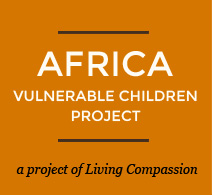Our day began at 9:00 a.m. at the Internet Café for computer lessons. Godfrey, as we suspected, is an excellent instructor; and our three students, Agness, Theresa, and Mr. Kayula, made good progress. (Those of us in support roles learned a little something as well!)
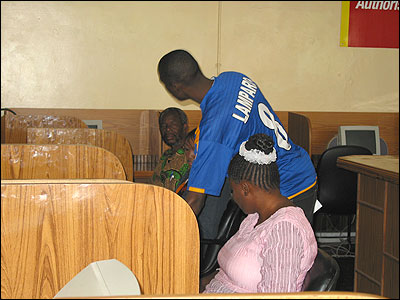
After class, we adjourned with Theresa to the Savoy to powwow about the up-coming week, which is turning out to be a record-breaker in the busy department. We have the meeting about our NGO status, a meeting with the water engineer about the well, the purchase of the property, checking with the micro-business folks, and meeting our new neighbors at the fledging community school next door. In addition, we need to shop for food supplies for our school, pick up a mattress for Yeta (more about that soon), and begin figuring out who needs black plastic for their roof (and how and where to get the plastic) before the rainy season starts in a few weeks.
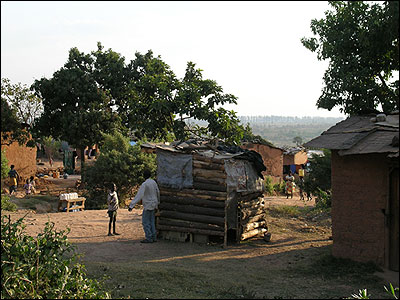
Many roofs in Kantolomba will not withstand the coming rains.
The system for the plastic is as follows: Theresa and the Coordinator will go around the compound determining which roofs need plastic. They will take measurements of the roof and note the family name and the amount of plastic needed. When the plastic is purchased, ten families at a time will pick up their plastic. The next day the Coordinator will make sure those folks put the plastic on their roof, and the process will be repeated with the next ten families. Sadly, what will happen without this method is that the men will sell the plastic to buy “beer” (the “moonshine” alcohol made from maize in “stills”), leaving the women and children in a house that will collapse in the rain. Theresa thinks there is time, even with this slow, laborious approach, to get all endangered houses covered by the first rains. (Please know, those of you supporting this work financially, that this is a huge contribution to the community. Without this intervention, many people would be left out in the rain, homeless.)
That arranged, we proceeded to do some errands while the shops were still open. The town begins to close up around noon on Saturday, and since everything is closed on Sunday, we wanted to take care of a few details before we were completely out of business. We bought fans for the kids’ rooms at the Living Compassion House, got a mosquito net for each of their beds, and picked out a mattress for Yeta, whose bed was so deplorable even her 17-year-old back was suffering. (An older person would have been crippled long before now!) We then came back to the Guest House to pick up the backpacks we’d selected for each of the children. To say they were delighted does not come close to conveying their level of joy. One of them declared they would not be able to sleep that night—just too much excitement.
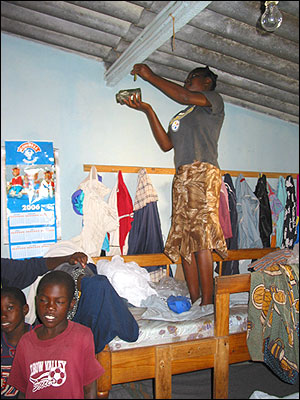
Working together to install the new nets.
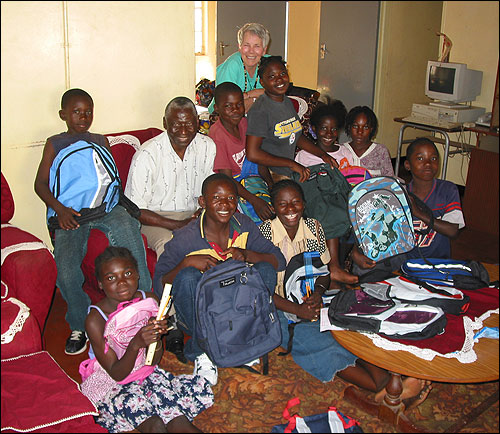
Everyone with their new backpacks.
We all walked down to the local market for chips and soda. I (Cheri) have become obsessed with the problem of garbage in this country, though I am limiting my immediate action to, first, Kantolomba, then Ndola. These people are being buried in garbage. And they have no choice about it. There is NOTHING for them to do with trash except dig holes in their yards and bury it. The yards are completely full. There’s no more room to dig holes. The sides of the streets and roads, every open field, sidewalks and “gutters” in town are overflowing with trash. There’s no landfill available, no city trash pick up, nothing. Then the rain comes and the whole thing becomes garbage soup. It’s a miracle anyone survives the diseases that flourish in such a setting.
As we walked along and the kids finished their bags of chips, they would throw them on the ground. I began my first little classes on ecology, pointing out how beautiful the country is and how much more beautiful it would be without all the trash. They could see that—though in truth I don’t know how much of our English they can understand. I asked them please, when they finished their chips, to give me the bags so I could properly dispose of them. (Where? You may ask. Good question. I think I’ll put them in my suitcase and bring them home!) Soon it became quite the fun game to deliver a bag and receive a “Thank you, Sir,” or “Thank you, Ma’am.”
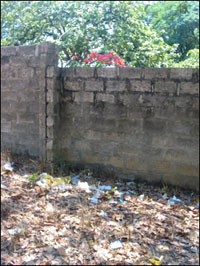 On Monday I will once again be bugging the powers that be to see if we can get a couple of acres near Kantolomba that can be designated as a dump site. When the contractor brings in equipment (surely they will need to do that even here?) to clear the site for the new buildings (and we will have a massive garbage removal program before the equipment comes in—our new lot currently looks like the dump!), we can have those couple of acres turned into a community dump. Then we can begin a community-wide program to train people to gather their garbage and dispose of it properly. We asked Theresa if she thought people would be open to that, and she assured us that they would. They don’t like the garbage everywhere. They just don’t know what to do. My next focus will be on getting a pickup truck that can be the compound garbage truck. Then we get a garbage collector and we’ll be in business. Slowly we can get those old pits cleaned out, and there will be room for small family garden plots. Then when the rainy season comes, no more garbage soup.
On Monday I will once again be bugging the powers that be to see if we can get a couple of acres near Kantolomba that can be designated as a dump site. When the contractor brings in equipment (surely they will need to do that even here?) to clear the site for the new buildings (and we will have a massive garbage removal program before the equipment comes in—our new lot currently looks like the dump!), we can have those couple of acres turned into a community dump. Then we can begin a community-wide program to train people to gather their garbage and dispose of it properly. We asked Theresa if she thought people would be open to that, and she assured us that they would. They don’t like the garbage everywhere. They just don’t know what to do. My next focus will be on getting a pickup truck that can be the compound garbage truck. Then we get a garbage collector and we’ll be in business. Slowly we can get those old pits cleaned out, and there will be room for small family garden plots. Then when the rainy season comes, no more garbage soup.
Small steps, but important ones. During our meeting with Ignatius the other night, he asked if we had seen Josephine while at Kantolomba. When we said we had, he remarked that he had seen her recently and was surprised at the obvious change for the better in her health. We agreed she looks wonderful. “You have changed her life,” he said, “and the lives of her children. You have changed the lives of so many people in Kantolomba. Children are going to school and eating every day. The teachers are eating. We even have a new Area Coordinator because of Living Compassion. So much you have done in such a short time.”
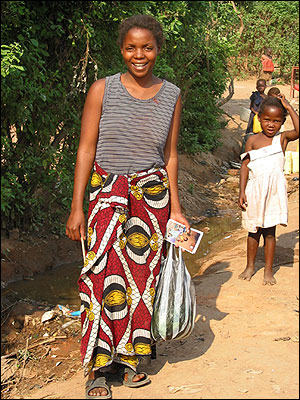
That’s for you, folks! That’s the difference you’re making in lives clear on the other side of the world. Take that in, please, and let it warm your heart the way your generosity is warming hearts here in Ndola, Zambia.
